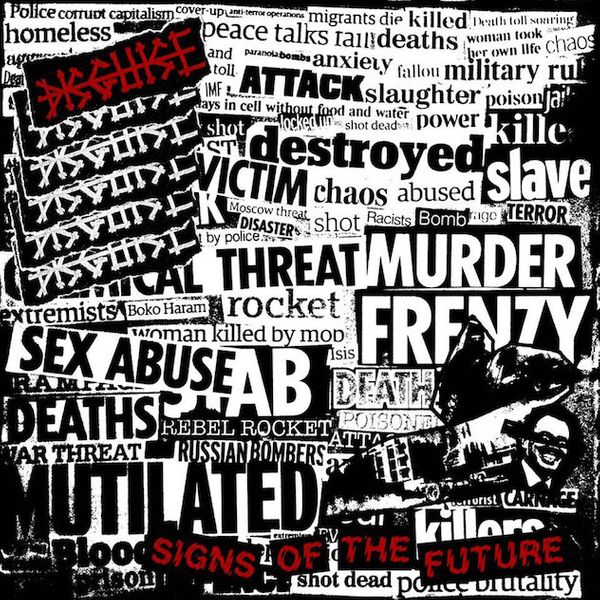Mothra: Decision Process
If you threw 90% of the heavyweight instrumental bands currently making music into a deep dark pit, I’d wager that few of them would ever be missed. I mean, let’s be honest, whether they’re progressive, experimental or post-whatever, there’s a massive surplus of entirely interchangeable bands making unengaging and uninspired music.
Of course, that still leaves us with the crucial 10% who’re producing ingenious and engrossing music. Those are the bands whose music is often as thrilling as it is sublime. And New Zealand instrumental trio Mothra are definitely in that rare group.
The Auckland-based band’s full-length debut, Decision Process, is, like Mothra’s monster movie namesake, a towering and dramatic beast. It’s also a dynamic and highly expressive album––as you’d hope a hefty instrumental release would be. But, most importantly of all, Decision Process is engaging.
There’s no shortage of captivating moments on the 12-track release, and Decision Process’ songs often feel like panoramic and ever-expanding soundscapes. The album has passages that are pummelling, propulsive, thundering, psychedelic, ambient, and haunting. And what Mothra do best is weave all of those different elements together to tell a story with each song.
Obviously, because Mothra are an instrumental band, the tales they’re telling are wordless. But a lack of vocals doesn’t diminish the band’s ability to create evocative and involving scenes with songs that speak volumes. It takes an astute understanding of rhythm, melody and arrangement to create meaningful instrumental tracks too. But, clearly, Mothra’s Hugh Allan (guitars, samples) James Armstrong (drums) and Reuben Saffer (bass) have a great deal of talent in that regard.
I’m guessing part of that talent comes down to the fact that Mothra have been treading the boards since 2008. That’s given them plenty of time to write and road test their material. And that time has clearly been put to good use refining what works and jettisoning what doesn’t.
Mothra have a couple of other factors working in their favour as well: their sound and aesthetic aren’ttied to any specific genre, and they aren’t bound to any set of rules. Instead, Mothra traverse vast swathes of sonic territory on Decision Process, with post-metal, sludge, and progressive metal playing as strong a role as progressive, experimental, and psychedelic rock.
Admittedly, that’s a lot of different styles of music to potentially feature in Mothra’s songs. But, to their credit, the band show a finely balanced sense of when to hold back and when to let the hammer drop. And they never overplay their hand by adding too many ingredients into individual songs.
That’s vividly illustrated as Mothra tear into Decision Process’ opening track, “Awake the Machine”, and then spend seven minutes showcasing all the band’s aggressive, atmospheric, and melodic strengths.
“The Beginning” carves impressively raucous musical furrows, and “Splinters”, “The Window” and “Corridor” have a similarly mammoth tone, density, and prog-metal temperament. “Myriad” and “Cataclysm” also provide gripping action via strident guitar and stentorian percussion, but Mothra don’t deal solely in driving rock.
“Elements of Sleep” is aptly entrancing and dreamy in parts, and “Escapism” is a tripped-out and rocketing journey into the great beyond. Dark ambient interludes “Solstice” and “Burnt Impression” highlight Mothra’s experimental side. And Decision Process ends with the album’s massive eponymous track roaring and soaring via six-string crescendos and crashing percussion galore.
Decision Process features an immense amount of highly involved music that’s been skillfully produced and is well suited for immersive headphone listening. The songs would also no doubt sound very impressive blasting out of a giant stack of amplifiers as Allan, Armstrong and Saffer work their progged-out power-trio magic live. And if you’re a dedicated fan of the multi-faceted instrumental music of internationally respected NZ bands like Jakob and Keretta, then rest assured that Decision Process also has a lot to offer.
On the flip side, it would also be understandable if some listeners struggled with Decision Process. It’s not a lightweight, casual or easy-listening album, and its lengthy running time is jam-packed with an enormous amount of intricate music to unpack and absorb.
Still, what doesn’t work for some is often a boon for others, and the fact that Decision Process is a challenge could also be seen as one of its very best attributes. We need more considered and cerebral music in a world where we’re spoonfed so much banal and disposable entertainment. And there’s certainly nothing superficial or passive about Decision Process.
In fact, you’ll get the most out of Decision Process if you deliberately set aside the usual day-to-day distractions and dedicate time to listen. I guess you could call that approach a little old school. A throwback to when albums were experiences. And Decision Process is definitely that, in every sense.
There’s a lot to be gained from actively engaging with Decision Process. The animated music is intelligent, ambitious, and imaginative. But more than anything else, Decision Process is a wonderful reminder that stopping and really listening to music brings far deeper meaning, and far greater reward.
Decision Process is highly recommended for rockers, rollers, habitual headphone listeners, and fresh-faced or long-term fans of heavyweight rock alike.





